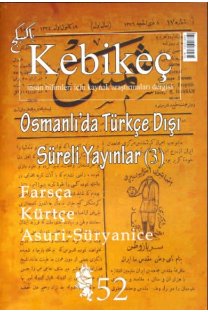Balkanlar Kültürel Elitinin Paradoksal Dağılışı: Bir Osmanlı Arnavut Hikayesi
The Paradoxical Dispersal of the Balkans’ Cultural Elite: An Ottoman-Albanian Story to the End
___
- Drita, No. 23: Sofya, 14 Kasım 1901.
- “Vellazërise’den Tashko’ya Kahire” (6 Aralık 1912), Arkiv Qendrori Shtetit, Tirana (AQSH), F.54.D.67.f.54–55.
- Pipa, Arshi. “Fan Noli as a National and International Albanian Figure”, Südost Forschungen 43 (1984), 241-270.
- Austin, R. C. Founding a Balkan state: Albania’s experiment with democracy, 1920-1925. Toronto: University of Toronto Press, 2012.
- “Osmanlı Elçiliğinden Bab-ı Ali’ye” (Atina, 27 Haziran 1902), Başbakanlık Osmanlı Arşivi, İstanbul (BBA) HR.SYS 128/18, 10070/157.
- “Leoni’den MAE Prinetti’ye” (Roma, 15 Mart 1902). Documenti Diplomatici Italiani (DDI), Serie 3: 1896-1907. Vol. VI. (Roma, 1985), 187. Doc. N. 251.
- Ginio, E. ‘Shaping the Constitutional Sultanate: The Reign of Mehmed Reşad (1909–18)’, Turkish Historical Review 10: 1 (2019).
- Trix, F. “The Stamboul Alphabet of Shemeseddin Sami Bey: Precursor toTurkish Script Reform”, International Journal of Middle East Studies 31 (1999).
- Isa Blumi, ‘Navigating the Challenge of Liberalism: The Albanian Orthodox Church’s Century’, S. Ramet (ed.), Orthodox Churches and Politics in Southeastern Europe (New York: Palgrave-Cham, 2019), 192-222.
- Blumi, Isa. Foundations of Modernity: Human Agency and the Imperial State. New York: Routledge, 2012.
- Blumi, Isa. Ottoman Refugees, 1878-1939: Migration in a Post-Imperial World. London: Bloomsbury Academic, 2013.
- Blumi, Isa. Reinstating the Ottomans: Alternative Balkan Modernities, 1800-1912. New York: Palgrave-Macmillan, 2011.
- Metropolit F. S. Noli, Fiftieth Anniversary of theAlbanianOrthodoxChurch in America, 1908-1958. Boston: AOCA, 1960.
- Anton Pashku (ed.) Topi i Lidhur. Prishtine: Rilindja, 1977.
- Skendi, S. The Albanian national awakening, 1878-1912. Princeton: Princeton University Press,1967.
- Makdisi, U. Age of Coexistence: The Ecumenical Frame and the Making of the Modern Arab World. Berkeley: Univ of California Press, 2019.
- “Hima’dan Temo’ya” (Roma, 20 Mart 1903), AQSH F.19D.32/2.f.278-280.
- Bashkimi i Shqiptarëve. AQSH F.23.D.25.f.5–6, ek (30 Haziran 1900)
- ISSN: 1300-2864
- Yayın Aralığı: 2
- Başlangıç: 1995
- Yayıncı: Mehtap Yüksel
Balkanlar Kültürel Elitinin Paradoksal Dağılışı: Bir Osmanlı Arnavut Hikayesi
Bulgarların Rehberliğine Soyunan Bir Gazete: Sıvetnik (1863-1865)
Osmanlı Dönemi Sırp-Hırvat-Boşnak Süreli Yayınları
Osmanlı Döneminde Bosna Hersek’ te Çıkan Gazeteler
Kornilia Preveziotou Tavaniotou’nun Kadın Dergisi İ Vosporis (İstanbul 1899-1906)
Anna Maria ASLANOĞLU, Anagnostopoulou CHRYSOULA
Avrupalı Seyyahların Gözünden Osmanlı’da Veba
1856 Islahat Fermanı’nın Amaltheia Gazetesinde Yansıması
Alexandros LAMPROU, Leonidas MOİRAS
Sırp Dilinde Osmanlı Mecmuaları: Carigradski Glasnik
İstanbul’daki Arnavutluk Kolonisi ve Osmanlı İmparatorluğu ile İlişkileri
